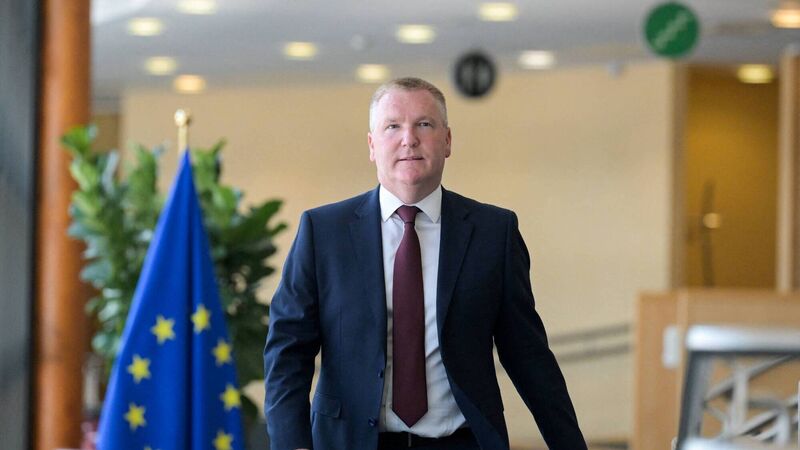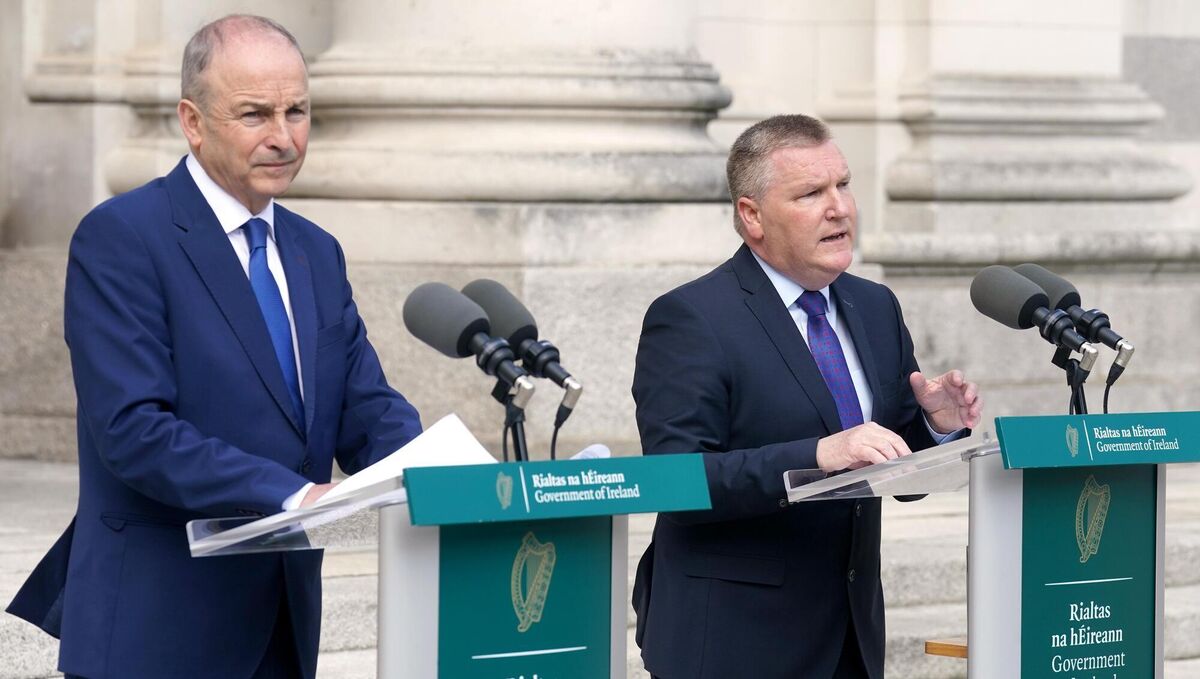Is our Cork man in Europe a future Irish leader?

EU commissioner for democracy, justice, the rule of law, and consumer protection Michael McGrath said he was 'committed to fulfilling my mandate in the European Commission for the next five years and we will see what happens then.'
He has been a county councillor for Passage West Town Council, a Cork South Central TD, and a minister for finance during a quarter of a century as an elected representative in Ireland, but Michael McGrath, since his appointment as European commissioner for democracy, justice, the rule of law, and consumer protection, has exchanged the comforts and perils of Irish politics for the heady heights of European Union (EU) diplomacy in Brussels.
When Mr McGrath was nominated by the Government, there was controversy about whether, as sought by EU Commission president, Ursula Von der Leyen, a female candidate should have also been nominated, because this would have increased the chances that Ireland’s nominee would have received an economic portfolio.
Now that Mr McGrath is in the job, he is finding it “challenging and rewarding”.
“I’ve found it incredibly fulfilling to engage with a wide range of people and work on initiatives that truly matter for citizens across Europe,” he said, describing his portfolio as “broad, exciting, and deeply impactful”.
“I’m responsible for ensuring that our justice systems across the EU are effective, fair, and resilient, while also protecting the fundamental rights of all citizens.
“This includes overseeing issues related to judicial co-operation, fundamental freedoms, and safeguarding democracy.
“A vital part of my work is also tackling disinformation, strengthening media freedom, and promoting an enabling environment for civil society, as well as ensuring that consumers are protected in an increasingly digital world.
“These areas are crucial for fostering trust in our institutions and ensuring that all citizens have access to fair and equal treatment.
“My portfolio gives me the opportunity to shape the future of the EU in ways that protect our values, empower individuals, and strengthen the rule of law, which are foundational to Europe’s prosperity.”
Trade war
As a global trade war is being threatened between the EU and the United States (US), following Donald Trump’s declaration — and subsequent partial reversal — of 20% tariffs on goods being imported from the EU, Mr McGrath says he is involved as one of the College of Commissioners in all decisions and proposals put forward by the commission.

“This means I also contribute to strategic initiatives, like the Competitiveness Compass, which is designed to foster Europe’s global competitiveness and simplify processes across the EU.
“Furthermore, I play an active role in decisions on global trade, ensuring that the EU remains a strong global player, promoting fair trade, and securing beneficial agreements for our economy.”
The role of the commission has come in to focus as tension surrounds trade between Europe and the US in the wake of the uncertainty caused by Mr Trump’s on-off tariffs. Particular concern has been expressed that the EU should not retaliate by targeting American bourbon whiskey, lest this provoke a higher tariff against Irish whiskey and other EU beverages, such as French, Italian, and Spanish wines.
Threat
The threats remain in abeyance, as does the US president’s desire to bring pharma jobs, now in Ireland, back to the US.
Mr McGrath said the EU has been “preparing for this scenario for many months”. “We will ensure our response is carefully calibrated and has regard to the strategic interests of member state economies, including Ireland,” he said.
“Ireland is part of Team Europe and we should not underestimate the strength of our position.
“We benefit from the EU Commission’s exclusive control over trade and tariffs.
“This prevents the US from gaining concessions from individual states and strengthens Ireland’s position as part of a bloc of 27 countries representing a single market of 450m.”
The other controversy that is front and centre of the commissioner’s radar is disinformation, fake news, and media freedom. According to Mr McGrath, the EU has faced “increased interference in the information space to influence elections and erode public trust”.
“To address this, the commission is preparing the European Democracy Shield, a key initiative to safeguard and strengthen democracy,” he said.
“The shield will build public trust in democratic institutions, empower citizens to critically engage with media and digital platforms, and support free, independent journalism and civil society organisations.”
Media
The commissioner is also involved in implementing the European Media Freedom Act, a new set of rules with EU-wide effect designed to protect media pluralism and independence throughout the market.
“The European Media Freedom Act protects editorial independence, ensures public media services operate independently, and guarantees transparency of media ownership,” Mr McGrath said.
“It also provides safeguards against the unwarranted removal by Very Large Online Platforms (VLOPs) — designated as such under the Digital Services Act — of media content produced according to professional standards and deemed incompatible with such platforms’ terms and conditions.
“It also ensures VLOPs act as neutral intermediaries and don’t interfere with editorial choices.
“Online platforms remain free to set the terms and conditions of their services. Yet, when content is legal and not harmful to society, Very Large Online Platforms are required to pay specific attention when applying their terms and conditions to content shared by media, which is in line with editorial standards, in order to respect media freedom and pluralism and to protect the space for professional journalistic information.”
In response to a question asking whether anything could be done under this legislation to regulate the ‘wild west’ in to which social media platforms, such as ‘X’, have been transformed under the ownership of Elon Musk, Mr McGrath said, “To exercise their democratic rights, citizens need access to reliable information. Several EU regulations, including the Digital Services Act (DSA), Political Ads Regulation, support this.
Hate speech
“Hate speech is a threat to democracy and fundamental rights. In January, the Code of Conduct on Countering Illegal Hate Speech Online+ was integrated in to the DSA, strengthening how platforms address hate speech under member state laws. Platforms must comply with the DSA and undergo independent audits.
“Signatories include major platforms like Facebook, Instagram, TikTok, and YouTube.
“The DSA is supported by a voluntary Code of Practice on Disinformation, aiming to reduce disinformation through transparency, user empowerment, and collaboration with fact-checkers.
“Finally, the 2023 commission recommendation on elections asks member states to take measures to protect the information environment around elections and ensure voters receive correct information.
“It also encourages political parties and campaign organisations to refrain from manipulative behaviour that threatens, or has the potential to negatively impact, values, procedures, and political processes.”
A constant issue about the EU is the level of engagement it has with people in the various member states — or, more precisely, the level of engagement people in countries like Ireland have with it.
The most recent measure of this is the turnout for EU Parliament elections last June, when 50.65% of voters cast a ballot for a candidate of their choice to represent them in the legislative body.
“While EU-wide turnout remained stable, at 50.74%, in 2024, with increases in 15 member states, Ireland’s turnout rose slightly compared to 2019, aligning closely with the EU average.
“The upcoming commission report on the 2024 elections will assess turnout and participation closely.
“Supporting effective information campaigns and civil society initiatives is crucial. The commission’s December 2023 recommendation on inclusive elections suggests measures to improve turnout. All stakeholders, including EU institutions, national authorities, political parties, and civil society, have a role to play.”
Return to Irish politics?
And what of Mr McGrath’s own engagement with the European Union? Is he planning a return to Irish politics at some point in the future?
While Mícheál Martin is giving no indication that he will step down as Taoiseach, there has been speculation that once his three-year term is finished, he will step aside as Fianna Fáil leader to allow one of his colleagues, either in the Cabinet or outside, to lead the party in to the next general election.
Mr McGrath’s response is non-committal, but it doesn’t rule out a return to domestic politics.
“None of us know what the future holds. I was an elected representative in Ireland for 25 years, including over 17 years in the Dáil,” he said.
“I greatly enjoyed my time in Irish politics and this experience is proving invaluable now in my new role.
“I am committed to fulfilling my mandate in the European Commission for the next five years and we will see what happens then.”







 App?
App?


